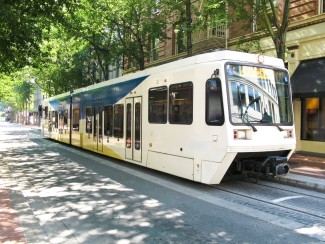This post is the second in a series on transportation system efficiency. The first post focused on policies to support mass transit, walking, and biking.
Dense, mixed-use neighborhoods that combine affordable housing, workplaces, and amenities can reduce climate pollution from cars and improve residents’ sense of community. But policymakers have often pursued land use that has instead encouraged car-dependent housing in sprawling suburbs while underinvesting in transit and other forms of low-carbon transportation like biking and walking. This leads to higher transportation cost burdens for many low-income families.
More equitable land use can be a step toward righting the wrongs of past policies—such as redlining—that harmed disadvantaged communities. To move away from heavy reliance on cars for transportation, policymakers need to enact land use policies to support a built environment that accommodates dense and affordable urban neighborhoods.
Land use policies can reduce GHG emissions from transportation
Personal vehicles are the country’s largest source of transportation-related greenhouse gas emissions. Unfortunately, car-centric zoning codes often incentivize—and sometimes only allow—detached single-family homes, which means that communities are more spread out and cannot support transit, bicycling, or walking.
Local governments can improve location efficiency with smart growth zoning strategies
To produce compact, mixed-use development, local governments can adopt smart growth strategies, including zoning that promotes transit and density, anti-sprawl policies, and codes that emphasize buildings that are compatible with their surroundings rather than codes that narrowly focus on how buildings are used. Conventional zoning codes organize communities and urban spaces by their uses; for example, a typical zoning code may only allow residential buildings (and prohibit commercial uses) in some areas. Instead, form-based codes allow for multiple uses to be near each other provided they are of appropriate scale, making it more likely residents are closer to their destinations. Zoning rules can also allow modifications from the standard zoning code in specific cases, like adding transit- and density-related requirements, which can reduce trips by car.
Some cities have begun to rethink their central business districts, as these areas, previously zoned almost exclusively for commercial uses, have not fully recovered from the COVID-19 pandemic and the shift to remote work for many office workers. This makes central business districts good candidates for additional housing. Cities can encourage the of some commercial buildings to housing through zoning codes. This would allow residents to live in job-, transit-, and amenity-rich areas and decrease reliance on personal vehicles.
Local governments can encourage denser development with other smart growth strategies, particularly policies that limit urban sprawl. Portland, Oregon, for example, instituted growth containment boundaries, which encourage density by setting limits for how far urban areas can expand, limiting sprawl. Policies like building moratoria that control the number of building permits issued in suburban areas can limit sprawl and promote density in urban areas, encouraging commuters to switch from personal vehicles to transit.
Governments in urban areas can also lower or remove minimum parking requirements. Requiring buildings to have a minimum number of parking spaces can increase costs and encourage people to drive more. Eliminating parking requirements also creates more space in cities for new housing and amenities, and for street designs that make it easier for residents to use low-carbon forms of transportation, such as bike lanes.
Newer buildings often lack units with three or more bedrooms, which contributes to sprawl as families move to the suburbs in search of housing that accommodates their needs. Land use and zoning regulations can encourage additional bedrooms through density or height bonuses or require some developments to include larger units to avoid pushing families out of cities.
Land use policies must center equity
Historically, federal, state, and local governments have weaponized zoning codes against disadvantaged communities, leading to inequitable outcomes. Residents may be skeptical of additional land use changes, so local governments should engage community-based organizations and disadvantaged community residents, encouraging them to take an active role in neighborhood land use and transportation planning and ensuring their needs are met. Engaging with these communities can limit unintended consequences such as gentrification and housing displacement when investment and development increases in neighborhoods.
Beyond community engagement, local governments can also act directly to prevent displacement and gentrification. Washington, DC, for instance, bought low-cost land and preserved it for affordable housing development. Local governments can also require developers to allocate a certain percentage of new or rehabilitated units to low- and middle-income households. However, policymakers should note that this approach is most successful when coordinated with other local governments in the surrounding metropolitan area because the effectiveness of these policies can depend on regional housing market conditions.
Many cities and localities have robust climate goals that will require substantial reductions in transportation emissions. Expanded transit and micro-mobility, more efficient land use, and reduced reliance on automobiles are practical tools to meet those goals. Cities should center equity in their planning and work with disadvantaged communities to create better places to live and work for all residents.


